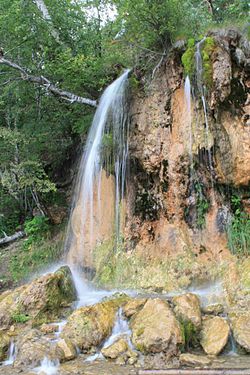Suksunsky District
Suksunsky District
Суксунский район | |
|---|---|
 , a protected area of Russia in Suksunsky District | |
 Flag  Coat of arms | |
 Location of Suksunsky District in Perm Krai | |
| Coordinates: 57°04′05″N 57°32′46″E / 57.068°N 57.546°ECoordinates: 57°04′05″N 57°32′46″E / 57.068°N 57.546°E | |
| Country | Russia |
| Federal subject | Perm Krai[1] |
| Established | February 27, 1924 (first),[2] 1935 (second),[2] 1964 (third)[2] |
| Administrative center | Suksun[1] |
| Area | |
| • Total | 1,977 km2 (763 sq mi) |
| Population | |
| • Total | 20,099 |
| • Estimate (2018)[4] | 19,433 (−3.3%) |
| • Density | 10/km2 (26/sq mi) |
| • Urban | 39.9% |
| • Rural | 60.1% |
| Administrative structure | |
| • Inhabited localities[1] | 1 Urban-type settlements[5], 62 Rural localities |
| Municipal structure | |
| • Municipally incorporated as | Suksunsky Municipal District[6] |
| • Municipal divisions[6] | 1 Urban settlements, 3 Rural settlements |
| Time zone | UTC+5 (MSK+2 |
| OKTMO ID | 57651000 |
| Website | http://www.suksun.ru |
Suksunsky District (Russian: Суксунский райо́н) is an administrative district (raion) of Perm Krai, Russia; one of the thirty-three in the krai.[1] Municipally, it is incorporated as Suksunsky Municipal District.[6] It is located in the southeast of the krai. The area of the district is 1,977 square kilometers (763 sq mi).[2] Its administrative center is the urban locality (a work settlement) of Suksun.[1] Population: 20,099 (2010 Census);[3] 21,925 (2002 Census);[8] 23,654 (1989 Census).[9] The population of Suksun accounts for 39.9% of the district's total population.[3]
History[]
The district was established on February 27, 1924, but was abolished between 1932 and 1935 and then again between 1963 and 1964.[2]
Demographics[]
Ethnic composition (as of the 2002 Census):[2]
- Russians: 83.4%
- Tatars: 8%
- Mari people: 6.9%
References[]
Notes[]
- ^ Jump up to: a b c d e Law #416-67
- ^ Jump up to: a b c d e f g Encyclopedia of Perm Krai. Entry on Suksunsky District (in Russian)
- ^ Jump up to: a b c Russian Federal State Statistics Service (2011). Всероссийская перепись населения 2010 года. Том 1 [2010 All-Russian Population Census, vol. 1]. Всероссийская перепись населения 2010 года [2010 All-Russia Population Census] (in Russian). Federal State Statistics Service.
- ^ "26. Численность постоянного населения Российской Федерации по муниципальным образованиям на 1 января 2018 года". Federal State Statistics Service. Retrieved January 23, 2019.
- ^ The count of urban-type settlements may include the work settlements, the resort settlements, the suburban (dacha) settlements, as well as urban-type settlements proper.
- ^ Jump up to: a b c Law #1719-349
- ^ "Об исчислении времени". Официальный интернет-портал правовой информации (in Russian). June 3, 2011. Retrieved January 19, 2019.
- ^ Russian Federal State Statistics Service (May 21, 2004). Численность населения России, субъектов Российской Федерации в составе федеральных округов, районов, городских поселений, сельских населённых пунктов – районных центров и сельских населённых пунктов с населением 3 тысячи и более человек [Population of Russia, Its Federal Districts, Federal Subjects, Districts, Urban Localities, Rural Localities—Administrative Centers, and Rural Localities with Population of Over 3,000] (XLS). Всероссийская перепись населения 2002 года [All-Russia Population Census of 2002] (in Russian).
- ^ Всесоюзная перепись населения 1989 г. Численность наличного населения союзных и автономных республик, автономных областей и округов, краёв, областей, районов, городских поселений и сёл-райцентров [All Union Population Census of 1989: Present Population of Union and Autonomous Republics, Autonomous Oblasts and Okrugs, Krais, Oblasts, Districts, Urban Settlements, and Villages Serving as District Administrative Centers]. Всесоюзная перепись населения 1989 года [All-Union Population Census of 1989] (in Russian). Институт демографии Национального исследовательского университета: Высшая школа экономики [Institute of Demography at the National Research University: Higher School of Economics]. 1989 – via Demoscope Weekly.
Sources[]
- Законодательное собрание Пермской области. Закон №416-67 от 28 февраля 1996 г. «Об админ��стративно-территориальном устройстве Пермского края», в ред. Закона №504-ПК от 9 июля 2015 г. «О внесении изменений в Закон Пермской области "Об административно-территориальном устройстве Пермского края"». Вступил в силу с момента опубликования. Опубликован: "Звезда", №38, 12 марта 1996 г. (Legislative Assembly of Perm Oblast. Law #416-67 of February 28, 1996 On the Administrative-Territorial Structure of Perm Krai, as amended by the Law #504-PK of July 9, 2015 On Amending the Law of Perm Oblast "On the Administrative-Territorial Structure of Perm Krai". Effective as of the moment of publication.).
- Законодательное собрание Пермской области. Закон №1719-349 от 10 ноября 2004 г. «Об утверждении границ и о наделении статусом муниципальных образований Суксунского района Пермского края», в ред. Закона №542-ПК от 6 октября 2015 г. «О внесении изменений в Закон Пермской области "Об утверждении границ и о наделении статусом муниципальных образований Суксунского района Пермского края"». Вступил в силу через десять дней со дня официального опубликования. Опубликован: "Бюллетень Законодательного Собрания и администрации Пермской области", №12, I часть, 9 декабря 2004 г. (Legislative Assembly of Perm Oblast. Law #1719-349 of November 10, 2004 On Establishing the Borders and on Granting the Status to the Municipal Formations of Suksunsky District of Perm Krai, as amended by the Law #542-PK of October 6, 2015 On Amending the Law of Perm Oblast "On Establishing the Borders and on Granting the Status to the Municipal Formations of Suksunsky District of Perm Krai". Effective as of the day which is ten days following the day of the official publication.).
- Districts of Perm Krai
- States and territories established in 1924
- States and territories disestablished in 1932
- States and territories established in 1935
- States and territories disestablished in 1963
- States and territories established in 1964
- 1924 establishments in the Soviet Union
